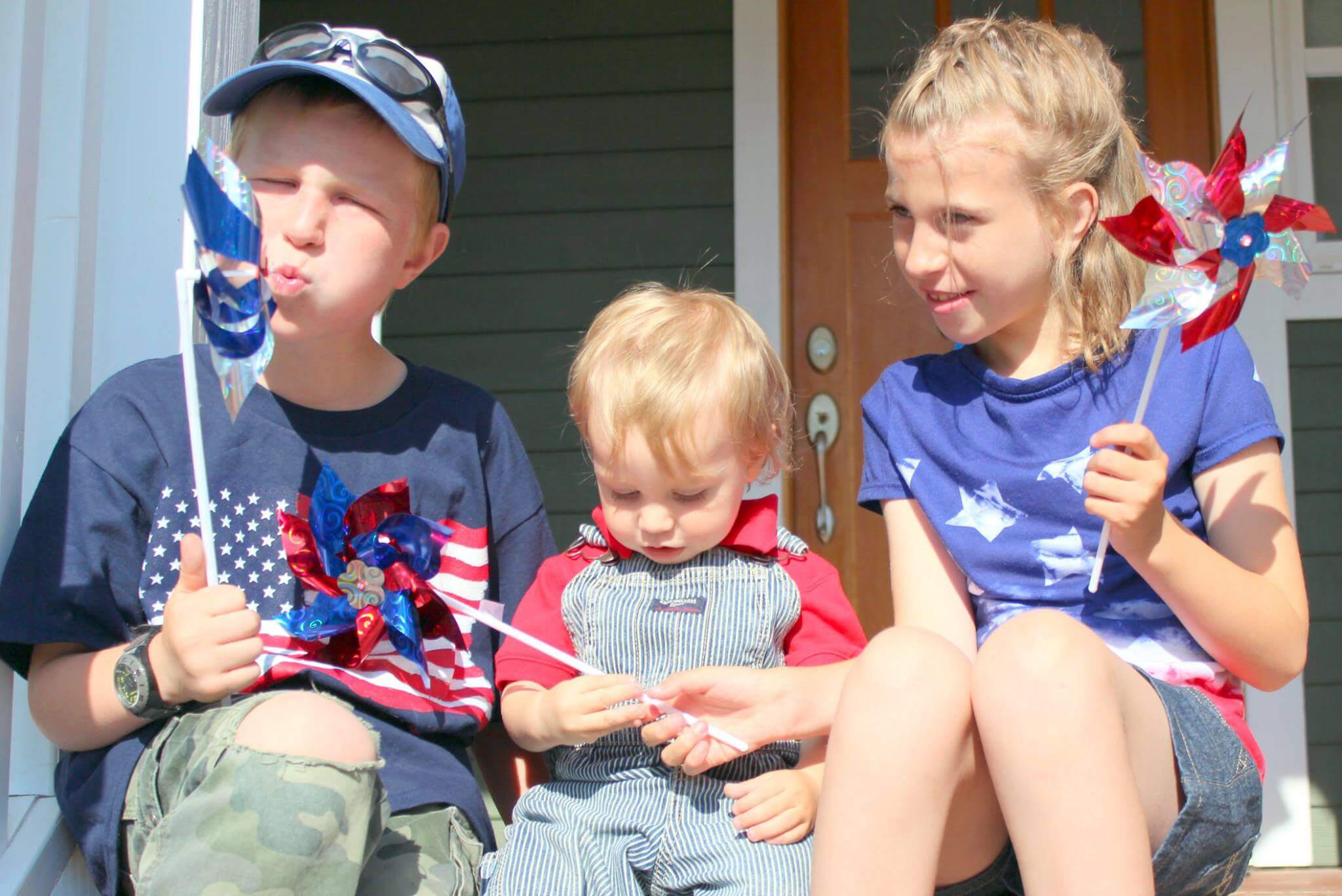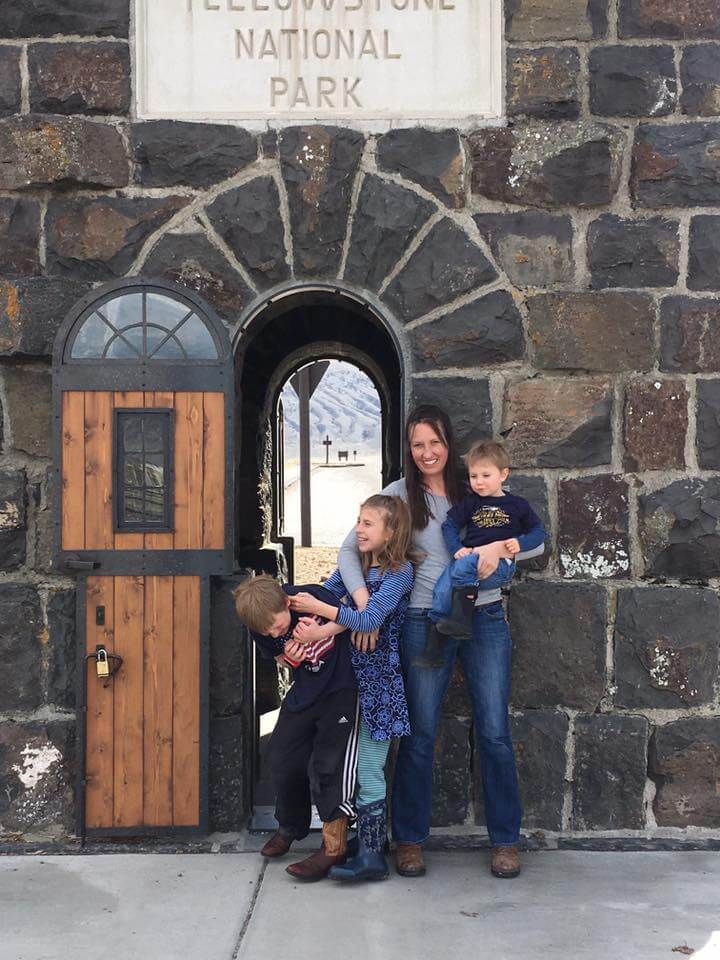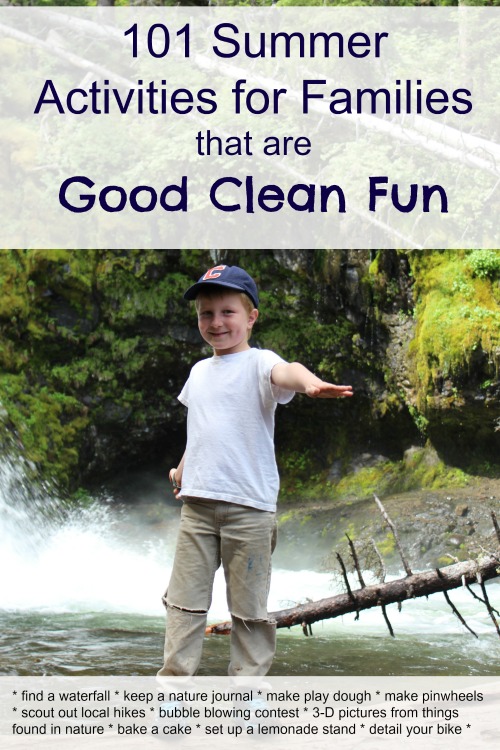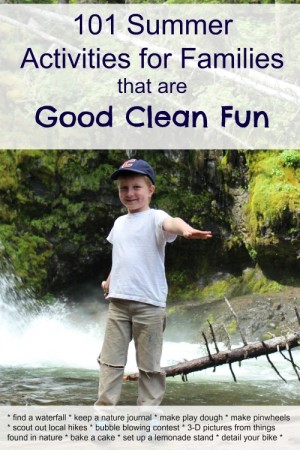
When we are out of school, it helps to carry on the routine of learning, doing, and following a plan for the day. We schedule camps, vacations, and visits first and then in the days between we establish a pattern. This helps everyone to know what to expect, and prevents us from trying to do too many things at once, or letting the summer go by without getting to our favorite activities.
We settle into a pattern of after-dinner bike rides, Monday or Tuesday errands and trips to the farmer’s market, Wednesday and Friday hikes, Saturday laundry day, and Sunday cooking in the afternoon. The toddler’s nap is a perfect time for craft projects, and we leave most afternoons free for visiting friends, the pool, or taking a movie afternoon when some time is needed to zone out.
We try for structure- not schedule. This allows for flexibility. On the days when we have energy to burn, we’ll go for a longer hike. If everyone is restless but we still need to get out of the house, we just walk around the near by pond.
 If there is more grumbling than cheering when you do some of these activities, know you are not alone. Children are still learning to connect the difficulty of a process with the joy of the reward. Living in Montana, I absolutely love summer and it’s a priority for me to expose my children to the beauty around us. There IS some fussing on nearly every trail and nearly every road trip from one or more children but we still keep on.
If there is more grumbling than cheering when you do some of these activities, know you are not alone. Children are still learning to connect the difficulty of a process with the joy of the reward. Living in Montana, I absolutely love summer and it’s a priority for me to expose my children to the beauty around us. There IS some fussing on nearly every trail and nearly every road trip from one or more children but we still keep on.
We’re still building memories. And looking back, they remember the cool fort at the top of a hike that someone made, watching the huge water falls, or swimming in the hotel pool after 8 hours of driving. Every year it gets easier, and we are setting our children up for a lifetime of experiencing new things even if they aren’t sure they’ll love the end result.
These are some of our favorite activities, things that I want my children to work on learning this summer, and other things I think will be fun to try. These activities are all free of junk food and excess chemicals, and won’t require a lot of setup time from the parents.
Around Town
- Be a Tourist! Been avoiding something because ‘everyone’ does it? Embrace what your town has to offer, reading the informational billboards, posing for pictures, and all.
- Learn about the major employers, or a cool business in your town. Do you have a fish hatchery? Is there a big employer in your town that makes something cool? Is there a college that you can learn about and walk around campus for a while? Learning about the local economy in an age appropriate way helps kids feel a sense of cooperation and belonging to their town.
- Library story time – find out when it is and see if it’s a good fit for your summer schedule.
- Find bike-accessible loops and trails and bike to a destination- lunch, a smoothie, or a fun park can all be fun destination hikes. See what parts of your town are specifically bike friendly.
- Make it a goal to visit every park in your city. List them and check them off one by one.
- Visit the fire station.
On the Trail
This is my favorite part of summer- getting outdoors. We are fortunate to have lots of local trails, but I have lived in 4 other cities and founds great walking and hiking trails in those areas as well. Some places just require asking around or looking a little harder. We hit the trail twice a week every week in the summer.
- Look for a guide book that has trails in your area and choose 5 that are age and ability-appropriate. Try to do a mix of the same and new trails for different experiences every time.
- Keep a nature journal. We purchased this book, blank sketch books, and colored pencils to share. They will pack easily on hikes.
- Learn about trail dangers. Get your boy scout on ;) Learn about grizzlies, mountain lions, spiders, snakes, and bugs- and how to stay safe, what to do if you encounter them, and precautions to take. Also explain how easy it is to get lost in the woods and the importance of sticking together on the trail. Learning about danger is both humbling for the children who have a tendency to think they are invincible, and empowering for the children who are more fearful.
- Learn basic first aid. Being out of cell phone range and away from the city can be a good motivator to learn how to take care of ourselves. Learning about basic essential oils to keep with us, a travel first aid kit for the hiking pack, and what to do in an emergency is a good lesson for the trail.
- Identify plants and animals with a guide book. This goes well with your nature journal.
- Learn to use a compass.
- Talk about trail etiquette (stay to the right, yield to horses, don’t cut switchbacks)
- Learn trail songs and sing them.
- Talk to a park ranger. Friendly folks, I love our rangers. Introducing our children and asking questions about the area is a great activity.
- Harvest edibles from your area – fish, plants, herbs, berries.
- Take binoculars and learn how to use them.
Road Trip Goals
Being able to travel on a road trip is a great gift. Starting with short but consistent trips when your children are young can help them to travel patiently when they are older.
- An atlas with the route that you’re taking highlighted so the child can follow along. You can print your route from Google Maps and help them to see where you’re going and follow along with a highlighter.
- Tip: Bring electronic toys out once everyone starts getting restless rather than letting them play with them right away; the novelty will give us another hour or more before we need to stop – and when you’re on a long road trip, you know how much longer it takes if you don’t postpone those rest stops!
- The license plate bingo game encourages them to look out the window – something that I see kids doing less and less as they rely on electronics to entertain them within the car.
- Involve kids in travel plans. Show them google maps and the different routes you could take, and how they take different amounts of time. Show them how you reserve the hotel room or camp ground.
- Again, be tourists. Find attractions along your route and stop there, rather than a truck stop.
- When packing, make a checklist of everything that needs to go in the kids’ suitcases, and help them to be responsible for making sure it is all there.
- For tips on having a successful road trip that involves staying in hotels and NOT eating junk or spending a fortune on food, see my tips here.
Lifetime of Learning
- Keep a reading chart to keep up the habit of reading every day.
- Learn fractions using measuring cups in the back yard pool.
- Print out a calendar and help kids learn how to follow along the days and look forward to special days like holidays, birthdays, and vacations.
- Use a prism to learn about light.
- Set up a bird feeder and learn about different bird seed and your local birds.
- Make a terrarium.
In the Kitchen
I love involving my kids in the kitchen. Teaching them to prepare food is one of the most important things that we can do to set them up to be healthy adults.
- Do the Kids Cook Real Food course- this can really provide structure and activities for the whole summer.
- Choose 5 easy-to-cook dishes that are age approrpiate, and learn how to make them from purchasing ingredients to assembling to cleaning up.
- Teach your kids to use sharp knives safely.
- Let your children look through cookbooks and choose treats to make- we make treats on Saturday, and I let them look through paleo cookbooks to see what they want to make.
- Make ice cream.
- Make popsicles. I make them from smoothies with my toddler twice a week. Then that’s our ‘snack’ in the afternoon all summer.
- Set up a chore routine for after meals – we go on a family bike ride after chores are done. I have my kids do one thing for a month, then switch, this encourages them to learn to do it well.
- Make kombucha.
- Grow an herb garden and learn how to use fresh herbs.
- Pick a restaurant or junk food favorite and figure out how to make it at home- even if it looks really complicated.
- Learn how to use a spiralizer for carrots and summer squash.
In the Water
Having children who are comfortable around water is a huge priority for me. Consistent exposure to swimming is the best way that I have found to have kids who are confident swimmers. We swim year-round and try for once a week during the school year and twice during the summer.
- Go tubing- is there a small creek or slow part of a river near you? Tubing doesn’t need to be an all-day thing, or done behind a boat, a few 100-foot runs down a creek, running up to the top and tubing down to where a parent helps you get out makes great memories.
- Advance swimming skills- you can see swim lesson plans here and use them to help your children improve. Lessons are fun and great for development too, but sometimes they don’t fit in the budget or summer time frame.
- Skip rocks.
- Make log boats (whittling comes in handy here too!) or play Pooh Sticks.
- Learn to fish. Sometimes local rec departments will have a learn to fish program that doesn’t even require a license. My love for Montana is showing, but developing a hobby that takes minimal equipment and takes people to areas without cell phone reception is something greatly beneficial for our culture.
- At the beach, big a big adult-sized shovel and help kids dig a huge hole. My uncle did this for my cousin and I every summer, and after a few minutes of work from him it was hours of entertainment for us.
- Building bridges, dams, and little rivers and cities is a great activity near the beach, river, or lake.
- Collecting shells, river rocks, or pine cones can be done in a bucket. Arrange by size, shape, or color to encourage children to notice details.
- Have a squirt gun fight- being on the water anyway makes this easy, and you don’t have to worry about flooding the back yard or leaving the hose running at home.
- Visit a splash park. These are worth a little bit of a drive, and they’re great if you have kids who aren’t confident in their swimming skills.
For the Future
Developing good work ethic is something that comes easier to some children than others. Because it is so important to their future, I make a point to gently, but persistently, encourage good work ethic and an understanding of working = paying bills AND having fun.
This isn’t so much the ‘jump around and eat treats’ kind of fun but it is interesting and provides satisfaction- which is a different kind of fun. When it’s framed right, children will usually pick up that this is something that we are excited that we get to do.
- Learning self-care. Learning to wash their own hair, do their own laundry, make their bed well, even clean the bathroom are all skills that take time to master.
- Explore different occupations, job shadowing or reading books about them if age appropriate.
- Set up a lemonade stand or other small business and learn about cost of doing business, sticking through with a task, and more.
- For older kids, setting up a (parent-supervised) blog or website could be a small business oppertunity and great learning activity.
- Learning to take care of their belongings- from washing the trike to vaccuming out the family car, to tuning up the breaks on their bike after a long ride can all be done with youtube videos.
- Teach children how to declutter and pass along what they don’t need or enjoy.
Crafts without Clutter
I love doing crafts with my kids, but I don’t love clutter from busy-work crafts. Some of these crafts will take more time to make, but you’ll love displaying or using them.
- 3D rock art is beautiful and can be displayed in a shadow box or just on the deck until summer is over.
- Whittling teaches fine motor skills, safety, and makes cool figures for a doll house or nature table.
- Pressed flowers make amazing stationary and reminders of hikes.
- Getting a canvas on sale at the craft store and creating a painting with acrylics can be displayed in their room or your home.
- Or add a blown up picture to the canvas with modge podge- great for aspiring photographers.
- Take pictures and put them in a scrapbook or picture alblum to remember the summer.
- Pin wheels are great for the 4th of July
- Stained glass made from tissue paper filters the light in your window beautifully.
- Clay can be played with and then put away.
- Play dough– make it yourself, and then play over and over.
- Learn to knit- dish cloths are great to start with and are useful.
- Tie dye makes wearable art (though this is a little stressful to do- we love it)
- Quilting is a great skill to learn and fun too.
- Magnets add personality and function to your fridge.
- Sock or finger puppets can be played with all summer long.
- Pottery painting- lots of towns have places where you can paint pottery, and then pick it up once it’s fired. This is a great quiet cool activity for older kids.
- Write a story, make a simple book, and illistrate it. Model after different authors or continue a series (good for older kids): Dr. Seuess, Sandra Boynton, etc.
- Make lip balm.
- Make soft dolls (these sell well on Etsy if you want a small business for yourself or an older teen)
- Dye play silks.
- DIY Crayons.
- Recycled T-shirt potholders and market bags.
- Wool dryer balls (this is good for preschoolers, toddlers love to play with them too)
- Mixes in a jar to give as gifts.
Thinking of Others
Bringing others joy is one of the best things in life. Explaining this and doing something kind for others on an intentional schedule will help make this a habit.
- Send a friend a picture or a postcard.
- Visit an elderly neighbor and bring cookies
- Raise money for your charity of choice.
- Mow someone else’s lawn.
- Offer to walk someone else’s dog.
- Pick up trash in a nearby park.
- Make a happiness jar.
In the yard
Sometimes staying in the back yard while mom is near by is needed. These fun activities are perfect for smaller outdoor places.
- Ladder golf. We love this game!
- Glacier melt: Freeze little plastic cars, dinosaurs, etc in a bowl full of water and then let the kids help them melt and discover them as they melt.
- Buried treasure- bury dinosaurs or treasure in the sandbox and then collect and store it away from the pirates.
- Bubbles– I love the no-spill bubbles that they have now! Older kids can have contests, either in number of bubbles in one blow or how big they get.
- Sprinklers are always fun. Catching water in buckets and filling small water guns prolongs this activity.
- Getting scrap wood, hammers, and nails (for older children) will provide hours and days of building and teach life long skills as well.
- Some longer pieces of wood and a few stumps are great for toddlers and preschoolers who want to build, roll, and balance.
- Painting with paint brushes and water on the side walk, deck or fence provides creativity without anything to clean up.
- Slip and Slides are quick to set up.
- Side walk chalk can be a little more messy than painting with water, but cleanup is still pretty easy.
- Mud pies! If you have a place to allow mud play, this can allow for hours of dirty-but washable fun.
- Identify the constellations that you can see from your yard and stay up late to see them.
Learn how to heal leaky gut

60-page ebook of all my best GAPS Diet (Gut and Psychology Syndrome) articles all in one place.




Thanks for being such a valuable resource for our family!
Love this post! Came at the perfect time. Thank you!
How did I miss this post!! ;) I’m printing it out and keeping it for the rest of the summer–just what I needed. Thank you!
I’m so glad to help Marisa! Have a fun summer :)